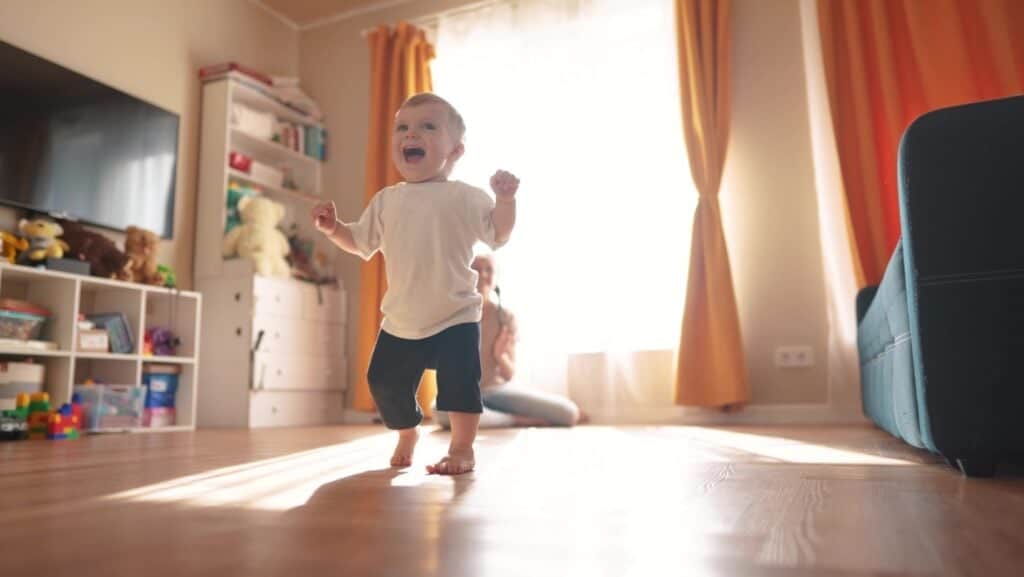What To Do If Your Kids Catch You Having Sex—And How to Handle It Based on Their Age
It’s every parent’s nightmare: you think the kids are asleep, your bedroom door is closed, and you and your partner are enjoying some long-overdue intimacy—when suddenly, a child walks in.
If this has happened to you, you’re not alone. It’s awkward, embarrassing, and confusing—but also completely survivable. What matters most is how you respond in the moment and in the hours, days, and even years that follow. Kids of different ages interpret what they’ve seen (and heard) very differently, so your approach should change based on their developmental stage.
Let’s talk about what to do right after the walk-in—and how to navigate the conversation depending on your child’s age.
First, A Second-Hand Story

Names have been changed. My ex told me a story that always made me smile. He was sleeping at a friend’s house, on the couch. They had a toddler. He woke up with a morning erection, and unbeknownst to him, he was not covered up with the sheet. Their child came downstairs in the morning and saw him on the couch. Later that day, the child told the parents, “I saw Sam’s penis, and it was dancin’!”.
I love so much about this. The child was taught real words for body parts, and they felt comfortable talking with their parents. As far as I know, no one was traumatized long-term.
Let’s see what the professionals say:
First Things First: Don’t Panic

It’s normal to feel mortified. Your heart might be pounding, your face may be burning, and your brain might race to a thousand worst-case scenarios. But the calmer you are, the calmer your child is likely to be.
Take a deep breath, cover yourself if necessary, and in the moment, gently but firmly guide your child out of the room. A simple, “Sweetheart, Mommy and Daddy are having private time. We’ll come talk to you in a minute,” will do the trick.
This is not the time to yell, shame, or freak out. A big overreaction can confuse or frighten your child more than the act they accidentally witnessed.
Why This Matters: Kids Don’t Always See Sex the Way Adults Do

According to the American Academy of Pediatrics, kids’ understanding of sexual behavior evolves gradually. A toddler might just see bodies tangled together. A school-aged child might think you’re wrestling. A teen? They probably know exactly what happened—although their emotional reaction may vary wildly.
Context is everything. Your child’s age, prior exposure to sexual topics, emotional maturity, and your family’s openness about bodies and boundaries all affect how this plays out.
So, let’s break it down.
Toddlers (Ages 1–3): Curious But Clueless

If your toddler catches a glimpse of something, chances are they won’t understand it as sexual. They may be more confused about the noises or the closeness than the act itself. You don’t need to launch into a big explanation.
What to Say: “Mommy and Daddy were having cuddle time. That’s private time just for grown-ups.”
Keep it short, loving, and simple. Then distract them with a snack, toy, or a book. Chances are they’ll forget it ever happened by bedtime.
Preschoolers (Ages 4–6): Starting to Ask Questions

Preschoolers might be curious and want to know what you were doing. They’re old enough to notice that something looked or sounded different but probably don’t grasp the meaning of sex.
What to Say: “You walked in on Mommy and Daddy having private time. Grown-ups show love in different ways. That’s something for adults, not kids.”
If they ask whether you were fighting, reassure them that you were not. Avoid lying, but keep it age-appropriate. You can add that everyone deserves privacy and that knocking is an important part of respecting other people’s space.
School-Age Kids (Ages 7–11): More Aware, Easily Embarrassed

By now, your child likely has a basic idea of how babies are made—or at least that sex is something private adults do. They may feel confused, grossed out, or even betrayed if they saw you doing something they associate with romantic movies or taboo topics.
What to Say: “You walked in on something private between me and your dad/mom/partner. I know that might’ve been uncomfortable or confusing. Do you have any questions?”
Give them space to process. Acknowledge their feelings without oversharing. Let them know you’re open to answering any questions they might have—and that grown-up intimacy is normal, healthy, and nothing to be ashamed of.
Preteens and Teens (Ages 12+): They Know What It Is, But Don’t Want to Think of You Doing It

Teenagers might react with sarcasm, disgust, or an immediate desire to never make eye contact again. That’s okay. They’re trying to process the idea that their parents have a romantic life, and for many, that’s a weird and even disturbing realization.
What to Say: “I realize that might have been uncomfortable to see. I’m sorry you walked in on us. You know we’re in a loving relationship, and physical intimacy is a normal part of that. If you ever want to talk about it, I’m here.”
The key here is respect. You don’t need to go into detail. In fact, don’t. But don’t dismiss their discomfort either. Normalize sex within a committed relationship, and remind them it’s healthy when consensual and private.
What Not To Say: Avoid brushing it off with “you’ll understand when you’re older” unless they’re truly too young. It can sound dismissive. Also, avoid shaming language like “You weren’t supposed to see that!” or “You were being naughty by not knocking.” That can create guilt and confusion around healthy sexuality and curiosity.
Instead, model calmness, privacy, and emotional maturity.
Tips to Prevent Future Walk-Ins

- Lock your door. Seriously. Invest in a lock.
- Teach boundaries early. Talk about knocking before entering, and model this by knocking before entering their rooms.
- Choose your timing wisely. Late nights, early mornings, or weekends when kids are out of the house are better bets.
- Use background noise. A white noise machine or soft music can help prevent sounds from carrying.
When to Worry

Most kids move on quickly if you respond with calm and compassion. But if your child seems distressed, anxious, or starts asking sexually inappropriate questions out of context, it might be time to talk with a child therapist or counselor.
According to child psychologist Dr. Laura Markham, kids don’t need details—they need safety. “When they see something they don’t understand, it’s up to us to give them an emotionally safe framework to process it. That means honest, age-appropriate responses that normalize intimacy within loving relationships.”
If You’re Co-Parenting or Divorced

This can be trickier, especially if your child catches you being intimate with a new partner. The emotional layers are heavier here—your child might feel confused, betrayed, or worried about loyalty to their other parent.
Be extra mindful of your child’s emotional state. Acknowledge that their feelings are valid, explain that adults sometimes form new relationships, and reassure them that they are always your priority. Keep the conversation open—but also don’t involve them in the adult dynamics.
The Takeaway

Getting caught in the act feels awful—but it’s not the end of the world. In fact, it can be an opportunity to reinforce healthy ideas about privacy, love, respect, and bodies.
Every child is different, and there’s no perfect script. What matters most is staying calm, being honest in an age-appropriate way, and showing your child that you’re a safe, trustworthy person to talk to—even when things get awkward.
Because let’s face it: in parenting, everything gets awkward eventually.
Should You Give Your Kids an Allowance—or Pay Them for Jobs?

It’s a question a lot of parents wrestle with: Do I give my child a regular allowance, or do I tie money to chores and specific tasks? There’s no one-size-fits-all answer. Both approaches come with their own pros and cons, and what works best really depends on your family values, your financial goals, and the kind of money lessons you want to pass on to your kids.
In this article, I’ll walk you through the benefits and potential downsides of each method—so you can decide what feels right for your family.
READ: Should You Give Your Kids an Allowance—or Pay Them for Jobs?
Join Us

Join us on this empowering journey as we explore, celebrate, and elevate “her story.” The Queen Zone is not just a platform; it’s a community where women from all walks of life can come together, share their experiences, and inspire one another. Welcome to a space where the female experience takes center stage. Sign up for our newsletter so you don’t miss a thing, Queen!







